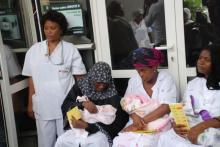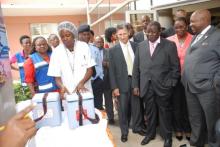Angola: Government and partners launch free Hepatitis B Vaccine as an act of social justice and health equity
Luanda, 17 July 2015 – The hepatitis B virus vaccine has been introduced into the Expanded Programme of Immunization (EPI) of Angola on 14th July 2015 as part of the joint efforts developed by the Government and health partners to reduce the mortality due to preventable diseases. The new antigen was launched during a ceremony chaired by the Governor of the Province of Luanda. In Luanda, about 106 thousand children (about 60%) are expected to be vaccinated, by December 2015.
The initiative will be implemented country wide with the technical support provided by the WHO and other health immunization partners. The introduction of the Hepatitis B vaccine is also part of a wide strategy which includes the increasing of the routine immunization coverage and the reinforce of breastfeeding promotion activities among mothers and health care providers.
Present at the same ceremony also were the Secretary of State for Health, Dr. Carlos Alberto Masseca, the Provincial Director of Health of Luanda, Dr. Rosa Bessa, the Director of the Maternal Hospital. Dr. Abreu Pecamena, the WHO Representative in Angola, Dr. Hernando Agudelo, directors of different programs from the Ministry of Health, municipal authorities and health partners.
«The Hepatitis B vaccine will be provided for free and will be available in all maternity hospitals through governmental funding», the Secretary of Health stated. According to national data, hepatitis B was the tenth cause of death in Angola, in 2014.
During the launching ceremony, the WHO Representative in Angola, Dr. Hernando Agudelo, stressed that is very important to ensure universal access to hepatitis B vaccine and to reinforce awareness activities among communities and health workers to ensure the long term health benefit of this vaccine. «If Hepatitis B vaccine is sustainable and universal we will be able to achieve the goal of reducing the morbidity and the mortality due to this disease», he underlined.
According also to the Secretary of State for Health, by introducing the hepatitis B vaccine in the EPI Programme the Government is committed with «Social justice and equity, with the purpose of preventing deaths from cirrhosis and liver cancer and to improve community health.
WHO recommends that all infants receive the hepatitis B vaccine as soon as possible after birth, preferably within 24 hours. The birth dose should be followed by three doses (when the child is 2, 4 and 6 months old) to ensure full protection against the disease.





